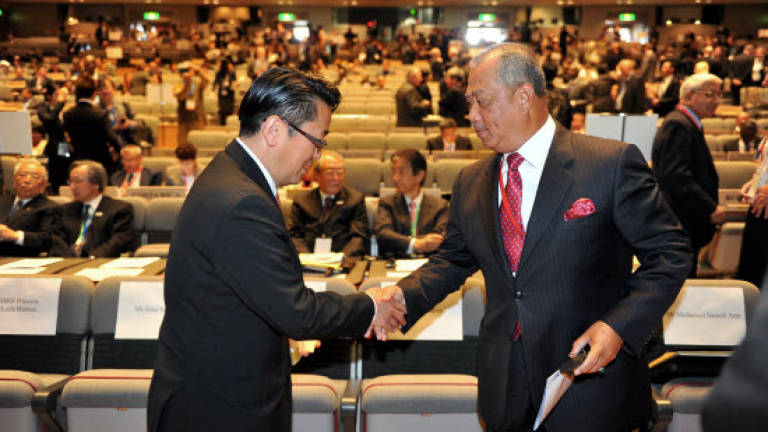DPM: Need to surmount damaging lifestyle patterns

NAGOYA: Malaysia has urged the international community to address challenges associated with unsustainable patterns of life collectively or risk jeopardising future generations.
In making the call, Malaysian Deputy Prime Minister Tan Sri Muhyiddin Yassin noted that today's world continued to face various critical challenges such as human-induced climate change, the spread of infectious diseases, the frequency of national disasters as well as loss of biodiversity and rapid depletion of natural resources.
"Striking a balance between the needs of the people and the conservation of the planet in the pursuit of peace and prosperity is pertinent to enhance the quality of life for today and the future generation," he said.
Muhyiddin, who is Education Minister, said this when delivering his statement at the 2014 Unesco World Conference on Education for Sustainable Development (ESD) under the banner of 'Learning Today for a Sustainable Future', at the Nagoya Congress Centre here Monday.
His attendance at the event, where he joined other participants from across the globe at the opening plenary themed 'Celebrating a Decade of Action', was in conjunction with his two-day working visit to Nagoya from Sunday.
Unesco stands for the United Nations Educational, Scientific and Cultural Organisation. Muhyiddin told the Nagoya gathering that commitment to change was required from all levels of the community, including grassroot activists, educators and policymakers.
"Only by working together at all levels can we ensure that ESD moves beyond the realm of pilot projects and individual case studies to a more system-wide catalyst for change," he said.
Noting that ESD formed a fundamental pillar in nurturing human capital with qualities for the 21st century, he said Malaysia had always been committed to ESD, with its national school curriculum, from preschool to secondary school, having incorporated ESD elements in the subjects taught.
The deputy prime minister shared with his audience that as a unique country with diverse cultures and traditions, the curriculum also focused on peace, social cohesion, cultural diversity, democracy and justice, among others, to foster inter-ethnic understanding.
"Malaysia, like many countries gathered here today, has made progress and has taken up various initiatives to promote ESD. Yet, I believe more needs to be done," Muhyiddin said.
The deputy prime minister spoke about the need for ESD to adopt cross-cutting or multidisciplinary approaches. In this regard, he said higher education institutions (HEIs) needed to be empowered as the main actor in mainstreaming ESD not only horizontally between them but also vertically to support schools and non-HEIs by cascading implementation and advocacy.
"Higher (education) institutions need to play a central role to develop relevant teaching materials and resources on ESD that seek to do more and better with less," Muhyiddin said.
In addition, he said, collaboration can be fostered diagonally involving community-based knowledge entities like recreational parks, cultural centres and even zoos. Muhyiddin further said that religious and faith-based approaches towards ESD had also been recognised.
"For example, Islam's concept of 'maqasid syariah' as a way of life in preserving and protecting life, intellect, posterity and property are consistent with values promoted under ESD," he said.
He took the opportunity to highlight paradigm shifts that should be considered to help move sustainable development goals forward, including moving away from production to preservation in efforts to minimise wastage and over-production.
He further mentioned the shifts from maximisation to optimisation as well as from ownership to stewardship, the latter referring to the notion that humans do not 'own' resources but are merely trustees to ensure resources remain undiminished for future generations.
Muhyiddin favoured a shift from what he described as 'silo-ed'- led approaches involving exclusively the government or private sector to collective-led partnerships encompassing government-academia-private-civil society.
This, he said, could be even at the level transcending national boundaries, citing the example of the Asean which groups 10 countries in Southeast Asia.
"With the emergence of the Asean Community by end-2015, Malaysia's role as Asean chairman can be instrumental in putting this shift into reality.
"Ín other words, post-2014 ESD has an even broader base to operate from which augurs well for co-creating a sustainable future," Muhyiddin said.
The three-day Unesco conference from Monday marks the end of the United Nations Decade of ESD (2005-2014) and will see the launch of the Global Action Programme on ESD.
Drawing some 1,000 participants, the event celebrates the achievements of the Decade, identify lessons learnt while setting the stage for the future of ESD. It also showcases initiatives, key players, networks and ideas that the Decade has stimulated.
Such examples from all over the world will help to generate future action under the Global Action Programme. The outcome of the conference will inform the deliberations of the World Education Forum to be held in Incheon, South Korea next year. – Bernama